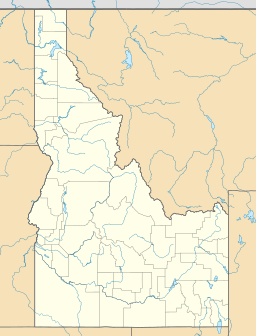Pulpit Lake facts for kids
Quick facts for kids Pulpit Lake |
|
|---|---|
| Location | Custer County, Idaho |
| Coordinates | 44°12′46″N 115°04′12″W / 44.212828°N 115.070086°W |
| Type | Glacial |
| Primary outflows | Creek to Stanley Lake Creek to Salmon River |
| Basin countries | United States |
| Max. length | 0.10 mi (0.16 km) |
| Max. width | 0.04 mi (0.064 km) |
| Surface elevation | 8,595 ft (2,620 m) |
Pulpit Lake is a small, beautiful lake found high up in the mountains of Idaho. It's located in Custer County, within the amazing Sawtooth Mountains. This special lake is part of the Sawtooth National Recreation Area, a place known for its stunning natural beauty.
About Pulpit Lake
Pulpit Lake is an example of an alpine lake. This means it's a lake located very high up in the mountains. It's also a glacial lake, which means it was formed a long, long time ago by huge sheets of ice called glaciers. As these glaciers moved, they carved out the land, leaving behind hollows that filled with water when the ice melted.
The lake is quite small. It's about 0.10 miles (160 meters) long and 0.04 miles (64 meters) wide. It sits at a high elevation of 8,595 feet (2,620 meters) above sea level. Water flows out of Pulpit Lake into a creek that eventually joins the Salmon River.
Exploring the Sawtooth Wilderness
Pulpit Lake is located inside the Sawtooth Wilderness. A wilderness area is a special place where nature is protected. There are no roads, buildings, or machines allowed. The goal is to keep the land as wild and natural as possible.
Because it's a wilderness area, you need a special permit to visit Pulpit Lake. You can get this permit at a registration box found at trailheads or at the edges of the wilderness area. These permits help park rangers keep track of visitors and protect the environment.
Getting There
Pulpit Lake is a bit tricky to reach because there are no marked trails leading directly to it. It's also not easy to find a path to the streams that flow into or out of the lake. The lake is located just southeast of a mountain called McGowan Peak and is upstream from a larger lake named Stanley Lake.



